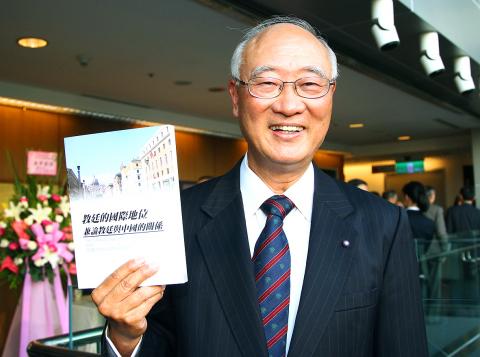|
Ex-envoy publishes book on Vatican
ties
By Shih Hsiu-chuan / Staff reporter

Former Taiwanese ambassador to
the Holy See Tou Chou-seng holds up his new book on Taiwan-Vatican relations
during a book launch in Taipei yesterday.
Photo: CNA
The Vatican has long hoped to establish
diplomatic relations with China, but that “could still be a long way off,”
because dialogue between the two sides — let alone negotiations — has yet to
develop, former ambassador to the Holy See Tou Chou-seng (杜筑生) said yesterday.
Having served as the nation’s ambassador to the Vatican, the only European state
to maintain diplomatic ties with Taiwan, between 2003 and 2008, Tou recently
published a book The International Status of the Holy See and its Relations with
China (教廷的國際地位兼論教廷與中國的關係).
At a book launch, Tou spoke about the evolution of the Vatican’s China policy
and possible future of relations between the Holy See, Taiwan and China,
questions he said he was often asked about.
The incident last month, in which China stripped Ma Daqin (馬達欽), the auxiliary
bishop of Shanghai, of his title has brought relations between China and the
Vatican to a new low, Tou said.
Ma’s ordination, with the approval of China and the Vatican, had been seen as a
hopeful sign that both sides could live with the disagreement over the
appointment of Chinese bishops, but that hope was dashed after Ma was placed
under house arrest for publicly renouncing the Chinese Catholic Patriotic
Association (CCPA), Tou said.
The CCPA is China’s state-run organization that controls the state-backed
Catholic Church and officially represents Chinese Catholics.
China runs the country’s Catholic church independently of the Vatican, and if
the situation remains unchanged, its aim of establishing ties with the papal
state is “a quixotic goal,” he said.
The Vatican has long held a “one China” policy, except during a period when Pope
Paul VI served as pope and advocated a “two China” policy in 1964 that would see
the UN recognize the People’s Republic of China without dropping the Republic of
China, Tou said.
When former president Chen Shui-bian (陳水扁) was re-elected in 2004, he had wished
that the nation’s diplomatic allies could add “Taiwan” to the names of their
embassy in Taipei, Tou said.
“Although the Holy See did not oppose the idea, it has never changed the name of
its embassy in Taipei. It is still called the ‘Apostolic Nunciature in China,’
while Holy See secretariat of state has addressed the nation’s embassy in
Vatican as the ‘Embassy of China to the Holy See’ in correspondence,” Tou said.
Tou said that he had, on various occasions, inquired with the Vatican about the
possibility of it switching recognition from Taipei to Beijing, following hints
by Vatican officials.
“The answer I received was always the same: That could only happen when most
people in China enjoy freedom of religious beliefs,” he said.
That does not mean that the Vatican would never establish diplomatic ties with
China, but the time has not yet come, he said.
In his book, Tou said that the Vatican has repeatedly promised Taiwan that the
Chinese Regional Bishops’ Conference, informally known as the Bishops’
Conference of Taiwan, and the nation’s embassy in the Vatican will be informed
of any major decision it makes on cross-strait relations.
It will not make a decision that would catch Taiwan unprepared, he said.
|
![]()
![]()
![]()